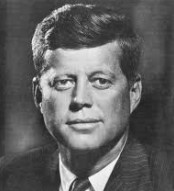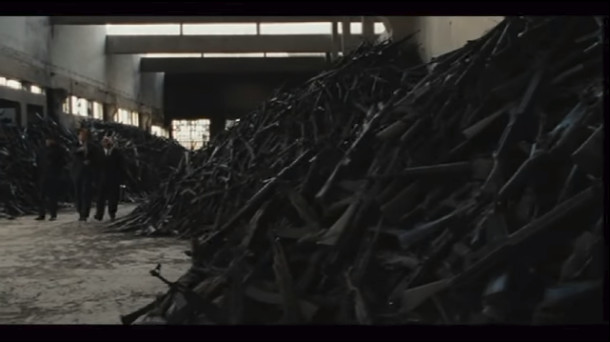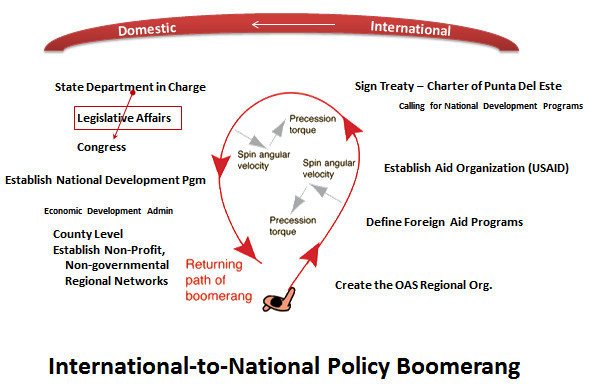UN Men for General and Complete Disarmament - Turn 'em all in
September 25, 1961, Address to the United Nations
 On September 25, 1961, John F. Kennedy gave a speech at the United Nation calling for the complete disarmament of the United States and Soviet Union.
On September 25, 1961, John F. Kennedy gave a speech at the United Nation calling for the complete disarmament of the United States and Soviet Union.
The next day, September 26, 1961, Kennedy signed Public Law 87-297, “Arms Control and Disarmament Act”.
Congress KNEW that disarmament would be the end of U.S. national sovereignty:
Definitions section in H.R. 9118
Sec. 3. As used in this Act–
(a) The terms “arms control” and “disarmament” mean the identification, verification, inspection, limitation, control, reduction, or elimination, of armed forces and armaments of all kinds under international agreement including the necessary steps taken under such an agreement to establish an effective system of international control, or to create and strengthen international organizations for the maintenance of peace.
Congressional Record, Proceedings, September 19, 1961
Prescott Bush
Albert Gore Sr.
Thomas J. Dodd
The U.S. State Department released Bulletin 7277 giving a summary of program for General and Complete Disarmament.
Blueprint for the Peace Race, May 1962
Credit to Bernadine Smith, Liberty Gun Rights for all the above research.
Significant excerpts from his speech:
“…So let us here resolve that Dag Hammarskjold did not live, or die in vain. Let us call a truce to terror. Let us invoke the blessings of peace. And as we build an international capacity to keep peace, let us join in dismantling the national capacity to wage war.
Today, of all days, our dedication to the charter must be maintained. It must be strengthened first of all by the selection of an outstanding civil servant to carry forward the responsibilities of the Secretary-General — a man endowed with both the wisdom and the power to make meaningful the moral force of the world community.
But the great question which confronted this body in 1945 is still before us: whether man’s cherished hopes for progress and peace are to be destroyed by terror and disruption, whether the “foul winds of war” can be tamed in time to free the cooling winds of reason, and whether the pledges of our charter are to be fulfilled or defied — pledges to secure peace, progress, human rights, and world law.
“Today, every inhabitant of this planet must contemplate the day when this planet may no longer be habitable. Every man, woman, and child lives under a nuclear sword of Damocles, hanging by the slenderest of threads, capable of being cut at any moment by accident, or miscalculation, or by madness. The weapons of war must be abolished before they abolish us.
It is in this spirit that the recent Belgrade Conference–recognizing that this is no longer a Soviet problem, or an American problem, but a human problem–endorsed a program of “general, complete and strictly and internationally controlled disarmament”…. And it is in this spirit that we have now presented with the agreement of the Soviet Union–under the label both nations now accept of “general and complete disarmament”.
The program to be presented to this Assembly–for general and complete disarmament under effective and international control….
It would completely halt their production as well as their testing, their transfer as well as their possession. It would achieve under the eyes of an international disarmament organization, a steady reduction in force, both nuclear and conventional, until it has abolished all armies and all weapons except those needed for internal order and a new United Nations Peace Force.
To destroy arms, however, is not enough. We must create even as we destroy–creating worldwide law and law enforcement as we outlaw worldwide war and weapons. In the world we seek, the United National Emergency Forces, which have been hastily assembled, uncertainly supplied, and inadequately financed, will never be enough.
Therefore, the United States recommends that all member nations earmark special peacekeeping units in their armed forces–to be on call of the United Nations, to be specially trained and quickly available, and with advanced provision for financial and logistic support.
In addition, the American delegation will suggest a series of steps to improve the United Nations’ machinery for the peaceful settlement of disputes–for on the spot fact finding, mediation, and adjudication–for extending the rules of international law.
We shall propose, further, cooperative efforts between all nations in weather prediction and eventually in weather control. We shall propose, finally, a global system of Communications satellites linking the whole world in telegraph and telephone and radio and television. The day need not be far away when such a system will televise the proceedings of this body to every corner of the world for the benefit of peace.
…Political sovereignty is but a mockery without the means of meeting poverty and illiteracy and disease. Self-determination is but a slogan if the future holds no hope.
That is why my nation, which has freely shared it’s capital and it’s technology to help others help themselves, now proposes officially designating this decade of the 1960’s as the United Nations Decade of Development. Under the framework of that Resolution, the United Nation’s existing efforts in promoting economic growth can be expanded and coordinated. Regional surveys and training institutes can now pool the talents of many; new research, technical assistance, and pilot projects that can unlock the wealth of less developed lands and untapped waters. And development can become a cooperative and not a competitive enterprise — to enable all nations, however diverse in their systems and beliefs, to become in fact as well as in law free and equal nations.
Finally–finally, as President of the United States, I consider it my duty to report to this Assembly on two threats to the peace which are not on your crowded agenda, but which causes us and most of you the deepest concern.
The first threat on which I wish to report is widely misunderstood: the smoldering coals of war in Southeast Asia. South Vietnam is already under attack–sometimes by a single assassin, sometimes by a band of guerillas, recently by full battalions…
The very simple question confronting the world community is whether measures can be devised to protect small and the weak from such tactics. For if they are successful in Laos and South Vietnam, the gates will be opened wide.
United Nations – Decade of Development
The United Nations system gives a decade to a stated goal for a collective global objective. The UN is a global communist organization that is propped up primarily by the United States.
United Nations International Decades
On March 13, 1961, President John F. Kennedy announced his Latin American Agenda…
Of particular note in the extensive list of legislation to establish the foreign aid infrastructure was the Foreign Aid Authorization Act of 1961. An extract of the webpage with highlights can be viewed HERE. A new agency, USAID was created by Executive Order 10973 to carry out the programs characterized as foreign aid.
On March 13, 1961 Kennedy announced his Latin American agenda in an address at a reception for members of Congress and Latin American republics’ diplomatic corps. The JFK Library described the event this way:
“In his speech the President proposes the establishment of The Alliance for Progress, a cooperative effort between the United States and Latin America to improve social, economic, and health conditions for millions of Latin Americans in need…”
A special meeting of the Inter-American Economic and Social Council was held in Punta del Este Uruguay. It began on August 5, 1961 and concluded on August 17, 1961. The Charter of Punta del Esta established the Alliance for Progress programme within the framework of the Organization of American States. All OAS members signed except Cuba.
The Charter included a section on Economic and Social Development obviously corresponding to the United Nations Economic and Social agenda.
Chapter II called for National Development Programs. It is at this point that you can clearly see the way the international agenda of the United Nations boomerangs back into domestic policy.
The point is that the United Nations Agenda for disarmament is the US Agenda for disarmament and it is the objective of these strangers who are in control of our government. They are not going directly at it because they’ve tried that and failed because of the 2nd Amendment and the power of the gun lobby. But Michael Bloomberg is changing that. He is leading a seditious organization of mayors and he is attempting to implement the UN Agenda of disarmament bypassing the national and state governments.
And on a personal note, I want to say that, having witnessed the unprecedented unity and cooperation of the past two months, that I have never been prouder to have once served within your ranks and never been prouder that the United States is the host country for the United Nations.
The founding of the United Nations embodied our deepest hopes for a peaceful world. And during the past year, we’ve come closer than ever before to realizing those hopes. We’ve seen a century sundered by barbed threats and barbed wire, give way to a new era of peace and competition and freedom.
The revolution of ’89 swept the world almost with a life of its own, carried by a new breeze of freedom that transformed the political climate from Central Europe to Central America, and touched almost every corner of the globe. That breeze has been sustained by a now almost universal recognition of a simple, fundamental truth: The human spirit cannot be locked up forever.
Not since 1945 have we seen the real possibility of using the United Nations as it was designed, as a center for international collective security.
New Partnership of Nations
Two days from now, the world will be watching when the cold war is formally buried in Berlin. And in this time of testing, a fundamental question must be asked, a question not for any one nation but for the United Nations, and the question is this: Can we work together in a new partnership of nations? Can the collective strength of the world community expressed by the United Nations unite to deter and defeat aggression? Because the cold war’s battle of ideas is not the last epic battle of this century.
Two months ago, in the waning weeks of one of history’s most hopeful summers, the vast, still beauty of the peaceful Kuwaiti desert was fouled by the stench of diesel and the roar of steel tanks. And once again, the sound of distant thunder echoed across a cloudless sky. And once again, the world awoke to face the guns of August.
But this time, the world was ready. The United Nations Security Council’s resolute response to Iraq’s unprovoked aggression has been without precedent. Since the invasion on Aug. 2, the Council has passed eight major resolutions setting the terms for a solution to the crisis. The Iraqi regime has yet to face the facts. But as I said last month, the annexation of Kuwait will not be permitted to stand. And this is not simply the view of the United States. It is the view of every Kuwaiti, the Arab League, the United Nations. Iraq’s leaders should listen. It is Iraq against the world.
Along with others, we have dispatched military forces to the region to enforce sanctions, to deter and if need be defend against further aggression. And we seek no advantage for ourselves, nor do we seek to maintain our military forces in Saudi Arabia for one day longer than is necessary. U.S. forces were sent at the request of the Saudi Government.
Open Borders, Trade and Minds
I see a world of open borders, open trade and, most importantly, open minds, a world that celebrates the common heritage (what common heritage? that we all walk on two legs?) that belongs to all the world’s people, taking pride not just in hometown or homeland but in humanity itself. I see a world touched by a spirit like that of the Olympics (hunger games), based not on competition that’s driven by fear, but sought out of joy and exhilaration and a true quest for excellence.
And I see a world where democracy continues to win new friends and convert old foes, and where the Americas – North, Central and South – can provide a model for the future of all humankind, the world’s first completely democratic hemisphere. And I see a world building on the emerging new model of European unity, not just Europe, but the whole world whole and free.
There are 10 more years until this century is out, 10 more years to put the struggles of the 20th century permanently behind us. Ten more years to help launch a new partnership of nations. And throughout those 10 years, and beginning now, the United Nations has a new and vital role in building towards that partnership.
Now is the Time of Testing
And we’ve shown that the U.N. can count on the collective strength of the international community. We’ve shown that the U.N. can rise to the challenge of aggression, just as its founders hoped that it would. And now is the time of testing. We must also show that the United Nations is the place to build international support and consensus for meeting the other challenges we face. The world remains a dangerous place, and our security and well-being often depends, in part, on events occurring far away. We need serious international cooperative efforts to make headway on the threats to the environment, on terrorism, on managing the debt burden, on fighting the scourge of international drug trafficking and on refugees and peacekeeping efforts around the world.
And the time has come to structure the U.N. role in such efforts more formally, and so today I propose that the U.N. establish a special coordinator for electoral assistance, to be assisted by a U.N. Electoral Commission comprised of distinguished experts from around the world.
This is a victory for every country in the coalition, for the United Nations. A victory for unprecedented international cooperation and diplomacy, so well led by our Secretary of State, James Baker. It is a victory for the rule of law and for what is right.
…The recent challenge could not have been clearer. Saddam Hussein was the villain; Kuwait, the victim. To the aid of this small country came nations from North America and Europe, from Asia and South America, from Africa and the Arab world, all united against aggression. Our uncommon coalition must now work in common purpose: to forge a future that should never again be held hostage to the darker side of human nature.
Tonight in Iraq, Saddam walks amidst ruin. His war machine is crushed. His ability to threaten mass destruction is itself destroyed. His people have been lied to, denied the truth.
First, we must work together to create shared security arrangements in the region. Our friends and allies in the Middle East recognize that they will bear the bulk of the responsibility for regional security…
Second, we must act to control the proliferation of weapons of mass destruction and the missiles used to deliver them. It would be tragic if the nations of the Middle East and Persian Gulf were now, in the wake of war, to embark on a new arms race. Iraq requires special vigilance. Until Iraq convinces the world of its peaceful intentions — that its leaders will not use new revenues to rearm and rebuild its menacing war machine — Iraq must not have access to the instruments of war.
And third, we must work to create new opportunities for peace and stability in the Middle East.
Fourth, we must foster economic development for the sake of peace and progress. The Persian Gulf and Middle East form a region rich in natural resources with a wealth of untapped human potential. Resources once squandered on military might must be redirected to more peaceful ends. We are already addressing the immediate economic consequences of Iraq’s aggression. Now, the challenge is to reach higher, to foster economic freedom and prosperity for all the people of the region.
Now, we can see a new world coming into view. A world in which there is the very real prospect of a new world order. In the words of Winston Churchill, a world order in which “the principles of justice and fair play protect the weak against the strong. . . .” A world where the United Nations, freed from cold war stalemate, is poised to fulfill the historic vision of its founders. A world in which freedom and respect for human rights find a home among all nations. The Gulf war put this new world to its first test. And my fellow Americans, we passed that test.
(Domestic Agenda)
Our first priority is to get this economy rolling again. The fear and uncertainty caused by the Gulf crisis were understandable. But now that the war is over, oil prices are down, interest rates are down, and confidence is rightly coming back. Americans can move forward to lend, spend, and invest in this, the strongest economy on Earth.
We must also enact the legislation that is key to building a better America. For example, in 1990, we enacted an historic Clean Air Act. And now we’ve proposed a national energy strategy. We passed a child-care bill that put power in the hands of parents. And today, we’re ready to do the same thing with our schools and expand choice in education. We passed a crime bill that made a useful start in fighting crime and drugs. This year, we’re sending to Congress our comprehensive crime package to finish the job. We passed the landmark Americans with Disabilities Act. And now we’ve sent forward our civil rights bill. We also passed the aviation bill. This year, we’ve sent up our new highway bill. And these are just a few of our pending proposals for reform and renewal.
So, tonight I call on the Congress to move forward aggressively on our domestic front. Let’s begin with two initiatives we should be able to agree on quickly: transportation and crime.







2 Comments
Kristin
Hi Vicky- I REMEMBER the October 1, 1990, Address to the United Nations & being very creeped out by it, I was barely old enough to buy a drink then- I was ignorant of geopolitics, US political system in general, but I did fear for the future of America in that speech, the planning and ultimate globalization and end of the United States as we knew it – as our grandparents knew it. Even the Christian TV-angelists spoke of it but in an occult, paranormal sort of way, to induce a spectacle I suppose.
Vicky have you ever taken a moment or two to read https://rense.com/general94/nwoplans.htm “United States was seen as continuing to be sort of the keystone of this global system” I’m skeptical of the claim re “inducing heart attacks as form of assassination” & one other fantastical claim, but the rest is compelling, especially about the education system as a tool of indoctrination “people will spend more time in school, but not learn anything”
As a matter of fact, that very transcript is what eventually led me to your site: ChannelingReality after searching on the internet for pages on globalism.
Vicky
No, I haven’t read it. I just skimmed through it and it looks right to me except that it started before 1969. I’ll have to take some time to read it.
The mention of Kennedy and development is important. It was Kennedy’s Alliance for Progress that was the conversion point from the Marshall Plan in Europe. They went from the European project to an international project of development (OECD). They use economic development as the cover for waging a strategy of synarchism against the target government. Think of the history of US involvement in Central and South America and how many government have fallen since the 1960’s.
I do believe they can induce heart attacks. When I was researching a guy in India on the subject of outsourcing, he said something important, then he went to Australia to a conference and had a heart attack. He was a young guy. But he made a very big mistake. His name was Dewang Mehta. It’s on this page about Harris Miller, one of the biggest traitor’s in this country’s history.
http://www.channelingreality.com/Cards/harris_miller.htm